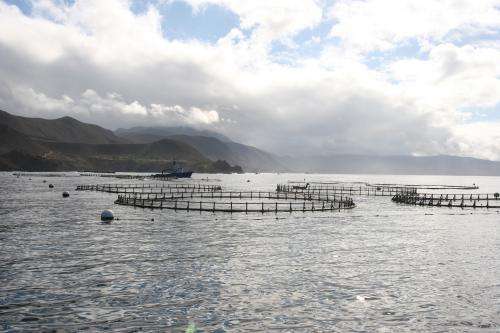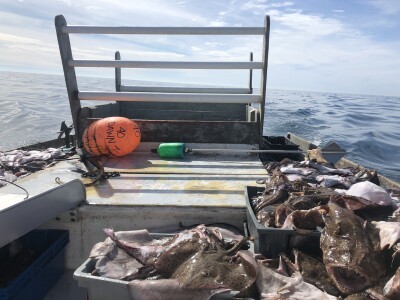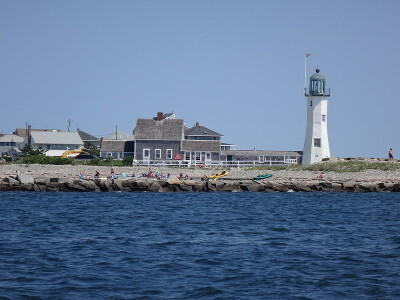The following is an excerpt from open letter to the U.S. House and Senate from more than 100 members of the fishing industry. Read the full list of the undersigned here.
We the undersigned owners/operators of American commercial fishing vessels and representatives of American fishing organizations and communities write to collectively express our opposition to industrial ocean finfish farming in the U.S. exclusive economic zone, whether through the Advancing the Quality and Understanding of American Aquaculture Act or any other legislative vehicle. This emerging industrial practice is incompatible with the sustainable commercial fishing practices embraced by our nation for generations and contravenes our vision for environmentally sound management of our oceans.
Industrial ocean fish farming — also known as open ocean, offshore, or marine finfish aquaculture — is the concentrated cultivation of captive finfish in the ocean, in net pens, pods, cages, or other devices. These operations are essentially underwater factory farms relying on natural currents to advect their waste and detritus to other parts of the ocean. The presence of finfish aquaculture in marine ecosystems poses significant challenges to the prosecution of domestic wild capture fisheries. As commercial fishermen, our livelihoods depend on good stewardship and science-based marine conservation to preserve sustainable fisheries for generations to come. The ocean currently provides a healthy and reliable food source and good jobs for many otherwise underserved coastal communities. We depend on a healthy marine ecosystem to supply quality, abundant wild fish stocks. Marine finfish aquaculture pollutes the natural ecosystem, degrades and threatens wild fish stocks, and challenges the economic viability of commercial fishing. American commercial fishing and marine finfish aquaculture cannot coexist.
We are concerned about the economic burdens that aquaculture, an emerging industry, poses to our long-established industry, America’s oldest. The presence of a single marine finfish farm could bar access to hundreds of acres of marine space, which would no longer be available for us to navigate or fish. Finfish aquaculture pens also act as “fish aggregating devices,” subjecting wild fish stocks to excessive fishing pressure from recreational fisheries in areas that are inaccessible to many commercial gear types. Marine finfish aquaculture facilities aim to produce large amounts of fish at the lowest cost possible, which places downward pressure on seafood prices, harming our wild capture seafood markets.
Flooding the market with cheap, low quality farmed seafood reduces the price that consumers are willing to pay for wild and sustainable seafood products, which directly impacts our well-being as sustainable seafood producers and the overall coastal economy. It also harms associated industries and workers who rely on a supply of high value product. Additionally, aquaculture is not dependent on seasonal accessibility, further driving consumers and the marketplace away from the natural seasonality of wild capture fisheries. Simply put, industrial seafood farms threaten the integrity of the wild fish populations that are key to our industry’s success, and the coastal communities we support.
Aquaculture harms the accessibility and quality of the wild fish stocks we depend on. Industrial ocean fish farming inevitably results in farmed fish escapes that can adversely impact wild fish stocks. Escaped aquaculture fish compete with wild fish and other species for food, habitat, and spawning areas. The culture of non-native fish brings attendant risks of introduction and invasion, while interbreeding of escaped aquaculture fish with wild stocks — a substantiated risk even with limiting cultivated species to “virtually” sterile or all-female native stocks — can lead to the modification and dilution of wild stocks’ genetic integrity. Escapees can also spread a number of lethal diseases and parasites, such as sea lice and piscine reovirus. Escape events can limit fishermen’s access to wild stocks and degrade the quality of wild fish available, reducing both the catch amount and the value. For these reasons, the potential for escapes by itself is reason enough to preclude open ocean aquaculture of any species, native or not.
Another important concern with large finfish aquaculture operations is the marine pollution caused by excess feed, untreated fish waste, antibiotics, and antifoulants. Such pollution alters the surrounding ecosystem and harms wild stocks. The release of excess nutrients degrades the marine ecosystem, leading to fish kills and impacting the seabed and water column. Ocean currents, no matter how strong, are not reliable methods for diluting net pen fish farm effluent. Often the ocean simply does not have the capacity to process this concentration and quantity of waste quickly enough, impacting wild fish stocks and their habitat. Fish farmers often disperse antibiotics and other chemicals within fish pens in an attempt to destroy pathogens. These toxins are harmful to the surrounding environment and marine life. Net pens also have high rates of deadly epizootic diseases, some of which can spread to wild fish stocks and cause a devastating loss to biodiversity and commercial fisheries. These impacts both degrade the environment and result in the loss of commercial catch.
Federal permitting and environmental review processes must thoroughly consider socioeconomic and environmental impacts, both in the National Environmental Policy Act process in other permitting processes. To date, such analyses have been inadequate. The NEPA process also requires consideration of alternatives including no action, closed-system fish culture approaches, and other actions that minimize adverse economic and ecological impacts posed by permitting these operations. We believe these adverse impacts are far too significant to justify permitting aquaculture activities in the EEZ.
Due to the extensive and well documented environmental harm caused by marine finfish aquaculture in the United States and elsewhere, this emerging industry should not be permitted. Neither the technology nor the knowledge is in place to sufficiently understand its environmental and socioeconomic harms and satisfy federally mandated environmental review and consultation processes. The legislation introduced by Sen. Roger Wicker and Rep. Steven Palazzo, the Advancing the Quality and Understanding of American Aquaculture Act (S. 3138/H.R. 6966), would hand regulatory authority over aquaculture to the National Oceanic and Atmospheric Administration under a radically permissive framework that ignores the severe consequences of aquaculture operations. But the AQUAA Act is not the only threat on the horizon — there is the possibility that an amendment to permit industrial ocean fish farms could be tacked onto a Magnuson-Stevens Act reauthorization package. Regardless of the legislative avenue, permitting this new industry would devastate ours.
Please protect our wild-capture fishing industry and the marine ecosystem by opposing any attempts to legitimize open net pen finfish aquaculture in our oceans.
See the full list of undersigned here.







